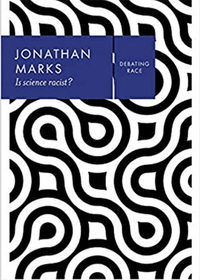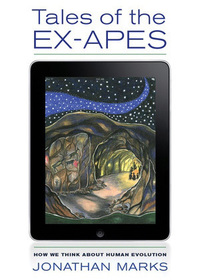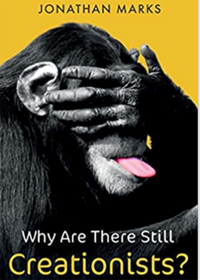
- University of North Carolina at Charlotte
- Professor of Anthropology
- Templeton Fellow (2013-2014)
- "How to Think about Human Evolution"
- Director's Fellow (2019-2020)
- "Why Are There Still Creationists?"
Jonathan Marks is Professor of Anthropology at the University of North Carolina at Charlotte, with primary interests in human diversity and human origins, and in the history of scientific investigations into those questions. He was trained initially in evolutionary molecular genetics, but has since developed far more eclectic research interests.
Professor Marks has been published in scholarly journals ranging from American Anthropologist to Zygon. He is the author of several books, most recently Is Science Racist? (Polity, 2017). Two of his books published by the University of California Press are titled What It Means to Be 98% Chimpanzee and Why I Am Not a Scientist, although paradoxically he is actually about 98% scientist, and not a chimpanzee.
Professor Marks has been a Visiting Research Fellow at the ESRC Genomics Institute in Edinburgh, and at the Max Planck Institute for the History of Science in Berlin. His work has been awarded the J. I. Staley Prize from the School of American Research, and the W. W. Howells Prize from the American Anthropological Association. He received the First Citizens Bank Scholars Medal from UNC-Charlotte in 2011. In 2013-2014 he was an Inaugural Templeton Fellow at the NDIAS, during which he wrote Tales of the Ex-Apes (California, 2015).
Publications
-
Is Science Racist?
Polity, 2017

Every arena of science has its own flash-point issues—chemistry and poison gas, physics and the atom bomb—and genetics has had a troubled history with race. As Jonathan Marks reveals, this dangerous relationship rumbles on to this day, still leaving plenty of leeway for a belief in the basic natural inequality of races.
The eugenic science of the early twentieth century and the commodified genomic science of today are unified by the mistaken belief that human races are naturalistic categories. Yet their boundaries are founded neither in biology nor in genetics and, not being a formal scientific concept, race is largely not accessible to the scientist. As Marks argues, race can only be grasped through the humanities: historically, experientially, politically.
This wise, witty essay explores the persistence and legacy of scientific racism, which misappropriates the authority of science and undermines it by converting it into a social weapon.
-
Tales of the Ex-Apes: How We Think about Human Evolution
University of California Press, 2015

What do we think about when we think about human evolution? With his characteristic wit and wisdom, anthropologist Jonathan Marks explores our scientific narrative of human origins—the study of evolution—and examines its cultural elements and theoretical foundations. In the process, he situates human evolution within a general anthropological framework and presents it as a special case of kinship and mythology.
Tales of the Ex-Apes argues that human evolution has incorporated the emergence of social relations and cultural histories that are unprecedented in the apes and thus cannot be reduced to purely biological properties and processes. Marks shows that human evolution has involved the transformation from biological to biocultural evolution. Over tens of thousands of years, new social roles—notably spouse, father, in-laws, and grandparents—have co-evolved with new technologies and symbolic meanings to produce the human species, in the absence of significant biological evolution. We are biocultural creatures, Marks argues, fully comprehensible by recourse to neither our real ape ancestry nor our imaginary cultureless biology.
-
Why Are There Still Creationists?: Human Evolution and the Ancestors
Polity, 2021

The evidence for the ancestry of the human species among the apes is overwhelming. But the facts are never “just” facts. Human evolution has always been a value-laden scientific theory and, as anthropology makes clear, the ancestors are always sacred. They may be ghosts, or corpses, or fossils, or a naked couple in a garden, but the idea that you are part of a lineage is a powerful and universal one. Meaning and morals are at play, which most certainly transcend science and its quest for maximum accuracy.
With clarity and wit, Jonathan Marks shows that the creation/evolution debate is not science versus religion. After all, modern anti-evolutionists reject humanistic scholarship about the Bible even more fundamentally than they reject the science of our simian ancestry. Widening horizons on both sides of the debate, Marks makes clear that creationism is a theological, not a scientific, debate and that thinking perceptively about values and meanings should not be an alternative to thinking about science – it should be a key part of it.